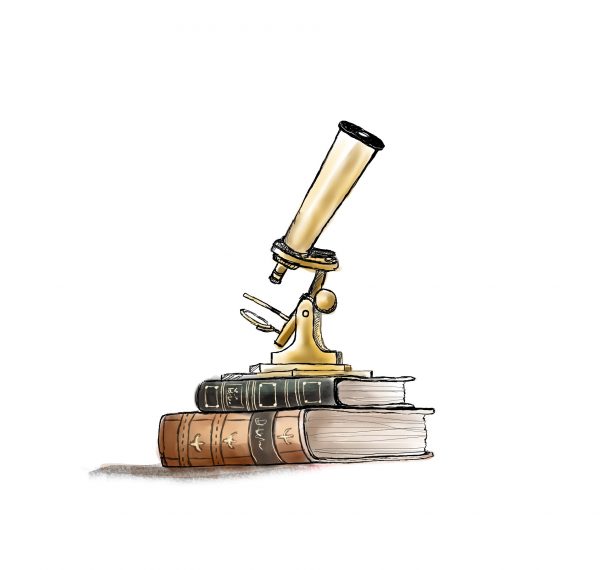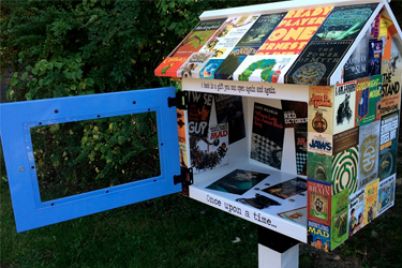
By Nicholas Ketchum
Deputy Editor
Almost everyone knows Charles Darwin: the man who “discovered” evolution via natural selection. What most people don’t know is how he was almost scooped by the competition, falling into history’s dustbin.
This was at least one takeaway from a more comprehensive lecture entitled “Darwin: Books, Beetles, and Botany” held in the Morris Lawrence Building on April 10.
David A. Wooten, a biology professor at WCC, delivered the lecture to a busy room of about 75 people, as he stood before his private collection of antique books and memorabilia directly relating to Darwin’s (and his predecessors’) work.
Wooten described how, for 20 years, Darwin worked on his groundbreaking idea of evolution via natural selection, keeping it mostly to himself out of fear he’d be exposed as an unprincipled heretic.
Others, before Darwin, had been cruelly singled out after proposing non-supernatural mechanisms for changes in and between species.
As Darwin continued developing his secret theory in the United Kingdom, Alfred Russel Wallace, another British polymath, then investigating wildlife in Malaysia, had progressed through similar studies looking at biodiversity and potential evolutionary mechanisms.
Before long, Wallace drafted his own paper exploring the subtle tree-like hierarchy of species’ differing characteristics. Although it didn’t yet present the idea of natural selection, the paper contained insights similar to Darwin’s in other areas.
Then—perhaps inevitably—Darwin came into possession of Wallace’s paper and read it.
However, Darwin didn’t express anger or frustration. In fact, he wrote supportively to Wallace, encouraging him to keep up the good work, and that he was also working on a similar topic.
Talk about friendly competition.
Soon after, Wooten pointed out, Wallace stumbled onto Darwin’s big idea: natural selection as the specific mechanism driving the pattern of evolutionary change. Already familiar with some of Darwin’s various works (those unrelated to natural selection), he wrote Darwin directly to tell him about his new hunch.
“Meantime, what’s Darwin doing? Everything, except for publishing,” said Wooten. “Darwin is working with pigeons on his property. Darwin is going to the London zoo, watching orangutans. Darwin is doing plant research throughout his greenhouses and backyard with orchids and carnivorous plants. Darwin is going in and working on beehives and the hexagon formation, trying to gather evidence. Twenty years of evidence gathering to show that his theory actually has some foundation.”
Now in receipt of Wallace’s latest letter mentioning concepts similar to natural selection, Darwin’s mood turned notably more acute. Darwin was “crushed,” as Wooten terms it.
By now, more than 20 years had passed since Darwin first began his work on evolution via natural selection—work he still hadn’t published. And now, Wallace was right on his heels, about to beat him to print.
Wooten described Darwin’s reaction: “He realizes he’d waited too long. He says, ‘All my originality will be smashed.’”
Now, at this crucial moment, Darwin’s closest friends and colleagues pressured him to print; it was finally time for him transcend his fear of upsetting polite society. But struck by a recent, tragic loss of a son, he couldn’t bear any additional stress. So, his friends and colleagues help him organize his pre-existing writings to be formally published.
Interestingly, and without Wallace’s knowledge, Darwin and his associates added Wallace’s name as an author in recognition of his own, independent work.
“They take what Darwin has, and they published a joint paper at the Linnean Society, and that joint paper is on the ‘Tendency of Species to form Varieties’, and it’s by first author, Charles Darwin, and second author, Alfred Russel Wallace,” Wooten said. “Darwin took priority in the publication because he had not just the concept, but 20-something years of empirical evidence to back it up.”
Wallace, returning to the United Kingdom, finds out—to his pleasant surprise—that he’s been published alongside highly reputable personalities in his field.
Despite the stakes, Wallace and Darwin not only stayed on good terms, but became lifelong friends.
According to Wooten, “There is no bad blood between Wallace and Darwin as some signs might imply. Wallace was actually very grateful to be included with this very honored group of naturalists, and then continues to write books to support Darwin’s theory.”
Wallace was subsequently unable to secure full-time positions in his career. Darwin provided Wallace with a pension for the rest of Wallace’s life.
No bad blood, at all. Not even an ounce.
Nearly a year later, in 1859, Darwin finally published his breakthrough book, “On the Origin of Species,” which is still considered one of the world’s most historically significant books, still relevant to this day.
And perhaps, if it weren’t for Wallace’s “competition” maybe the book, and its author, would both display a different name today.


